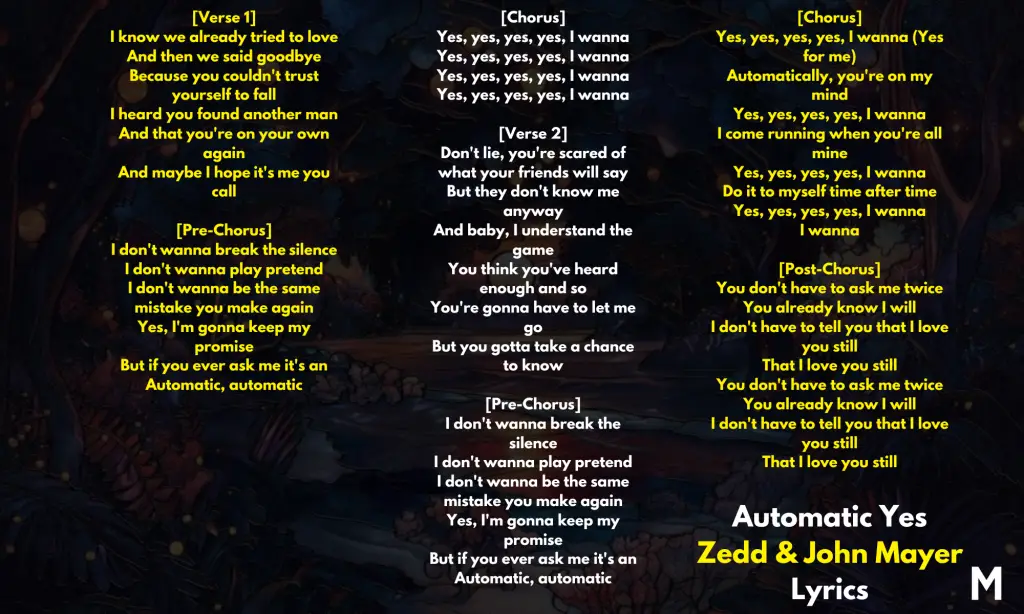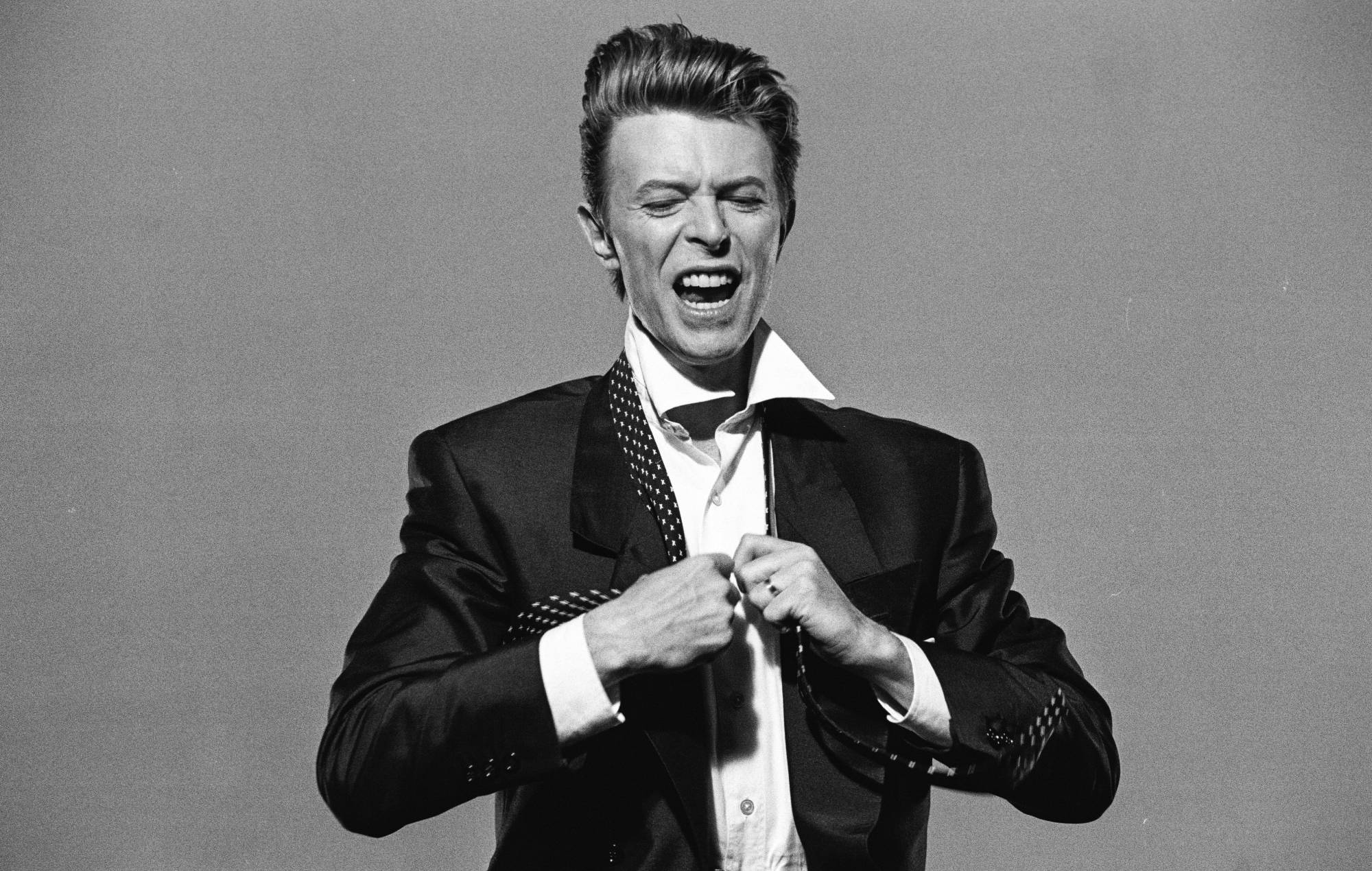Table of Contents
“Automatic Yes” brings together the talents of two music heavyweights: Zedd and John Mayer. Featured on Zedd’s long-anticipated 2024 album, Telos, the song captures a unique intersection between electronic and pop-rock styles. The collaboration itself was born out of mutual admiration and a shared desire to create something outside their usual genres.
Zedd, a Grammy-winning producer best known for his work in electronic music, saw Telos as an opportunity to reconnect with his artistic roots while embracing a more introspective approach.
Mayer, on the other hand, brought a lyrical and melodic depth to the song, contributing to a narrative that explores the internal conflict between staying true to one’s boundaries and being drawn back into a relationship that feels inevitable. This track, like the rest of the album, reflects Zedd’s goal of pushing the limits of his music both thematically and sonically.
And See John Mayer TOO – Live In Concert
[embed]https://youtube.com/watch?v=1I5fPInZkFM&si=YU97zOXMxGnP_TFt[/embed]Automatic Yes Lyrics

Automatic Yes By Zedd And John Mayer Meaning
Verse 1: Acknowledging the Past
The first verse opens with the lines:
“I know we already tried to love / And then we said goodbye / Because you couldn’t trust yourself to fall.”
This section of the song immediately establishes that the relationship in question has history—and not an entirely positive one. The line “tried to love” signals an effort that didn’t quite succeed, while “couldn’t trust yourself to fall” suggests that the relationship faltered due to one partner’s hesitance to be vulnerable. This hesitation often stems from a fear of being hurt or of repeating past mistakes, which sets the tone for the rest of the song.
“I heard you found another man / And that you’re on your own again / And maybe I hope it’s me you call.”
Here, the narrator acknowledges that their ex has moved on to another relationship, but is now single again. The line “maybe I hope it’s me you call” reveals a lingering hope and an emotional attachment that hasn’t faded despite the breakup. In my view, this kind of unresolved feeling is what makes the song resonate—it’s about wanting to reconnect even when logic says it’s probably not a good idea.
Pre-Chorus: The Struggle to Stay Away
The pre-chorus adds a layer of emotional conflict:
“I don’t wanna break the silence / I don’t wanna play pretend / I don’t wanna be the same mistake you make again.”
The narrator is clear about not wanting to initiate contact (“I don’t wanna break the silence”), but at the same time, they express a desire to avoid “play[ing] pretend”—pretending that these feelings don’t exist. The line “I don’t wanna be the same mistake you make again” indicates an awareness of the risks involved in re-engaging. What I take from this is that the narrator is battling between doing what’s emotionally satisfying and what’s actually healthy.
“Yes, I’m gonna keep my promise / But if you ever ask me, it’s an / Automatic, automatic.”
This is where the emotional conflict is laid bare. The narrator has made a promise, maybe to themselves, to stay away. But despite that, if the ex were to reach out, the response would be automatic. It’s a line that reflects an involuntary reaction—something that Zedd has touched on in his interviews. He spoke about how the concept of telos shaped the album, and I believe that’s evident here. The song shows how sometimes we feel an innate pull towards people or situations, regardless of the promises or logical boundaries we set.
Chorus: Unwavering Willingness
The chorus is where Zedd uses repetition to drive home the point:
“Yes, yes, yes, yes, I wanna / Yes, yes, yes, yes, I wanna.”
The repetition of “yes” serves to emphasize just how automatic this willingness is. There’s no hesitation—just an immediate, almost instinctive response. It’s straightforward, almost simplistic in its delivery, but it perfectly captures the essence of the song’s message: despite everything, the narrator’s desire to reconnect remains strong and constant.
Verse 2: External Pressures and Understanding
The second verse shifts focus to the influence of others:
“Don’t lie, you’re scared of what your friends will say / But they don’t know me anyway / And baby, I understand the game.”
The narrator addresses the social pressures that complicate the relationship. The phrase “you’re scared of what your friends will say” suggests that the ex’s hesitation might not just be about personal fears but also about how others might perceive their decision to reconnect. This is something Zedd mentioned when discussing the album—how external voices and social expectations can shape our choices. Here, the narrator tries to dismiss those opinions, suggesting that they’re not grounded in true understanding of the situation.
“You think you’ve heard enough and so / You’re gonna have to let me go / But you gotta take a chance to know.”
The narrator acknowledges that the ex believes they have enough reasons to stay away. But there’s a plea embedded here: “you gotta take a chance to know.” It’s a call for the other person to push past assumptions and give the relationship a real chance. This line speaks to the idea that sometimes, what we think we know can prevent us from discovering something deeper.
Pre-Chorus and Chorus: Emotional Reinforcement
The pre-chorus and chorus repeat, with the slight addition of lines like:
“Automatically, you’re on my mind / I come running when you’re all mine.”
These additions expand on the “automatic” theme introduced earlier. It’s not just about responding automatically if asked; it’s also about the automatic nature of thinking about the ex and longing for them. The chorus remains unchanged, with the repeated “Yes, yes, yes, yes” underscoring the consistent willingness to say yes, no matter what.
Post-Chorus and Bridge: Reinforcing Love and Commitment
The post-chorus repeats the sentiment of unwavering love:
“You don’t have to ask me twice / You already know I will / I don’t have to tell you that I love you still.”
In this section, the narrator emphasizes that their feelings haven’t changed. The repetition of “I love you still” is meant to reassure the listener (and perhaps the ex) that despite the passage of time and the breakup, that love is as present as ever. There’s a certainty in these lines that contrasts with the earlier hesitation—no matter what, this love remains.
Conclusion: Exploring the Song’s Emotional Complexity
Zedd’s use of the concept of telos throughout Telos really comes through in “Automatic Yes.” It’s a track that reflects the internal struggle between honoring a promise to stay away and the instinctive reaction to say yes when confronted with a past love. The collaboration with John Mayer was crucial here—Zedd mentioned that it was Mayer who suggested building the lyrics and melody around the “automatic” theme, taking the song in a direction that Zedd wouldn’t have reached on his own.
In the context of the album, Automatic Yes isn’t just about romantic conflict; it’s about the conflict between rationality and emotion, between setting boundaries and having those boundaries dissolve the moment they’re tested. That’s what makes it so compelling—it’s a track that captures the very human experience of trying to move forward while still feeling the pull of the past.
This depth is what Zedd was aiming for with Telos. He wanted to make music that felt meaningful and true to his own experiences, rather than trying to recreate the success of Clarity. Automatic Yes achieves that goal by combining Zedd’s electronic roots with Mayer’s melodic sensibilities, creating a song that’s both introspective and universally relatable. It’s a standout track on the album that reinforces the theme of searching for personal truth and dealing with the inevitable emotional complexities that come with it.
What Does “TELOS” Mean Anyways?
Telos is a Greek philosophical term that refers to an individual’s ultimate aim, purpose, or end goal. In ancient Greek philosophy, particularly in the works of Aristotle and the Stoics, telos is associated with the idea of fulfilling one’s true nature or potential. It’s about the intrinsic purpose that gives meaning to a person’s actions and life as a whole.
For example, Aristotle believed that everything in nature has a telos, including human beings. For humans, he argued, the telos is to achieve eudaimonia, often translated as “flourishing” or “well-being.” In this sense, telos represents the highest good or the realization of one’s true self through virtuous living and personal growth.
When applied to art or music, like Zedd’s album, Telos can signify a deeper exploration of purpose, creative intent, and the journey to self-discovery. By choosing this title, Zedd suggests that the album is not just about producing songs but is an exploration of the meaning and purpose behind his music and artistic choices.
The post Zedd And John Mayer’s Automatic Yes Lyrics And Meaning: My Take on Their Unconditional Love and Inner Conflict appeared first on Magnetic Magazine.



